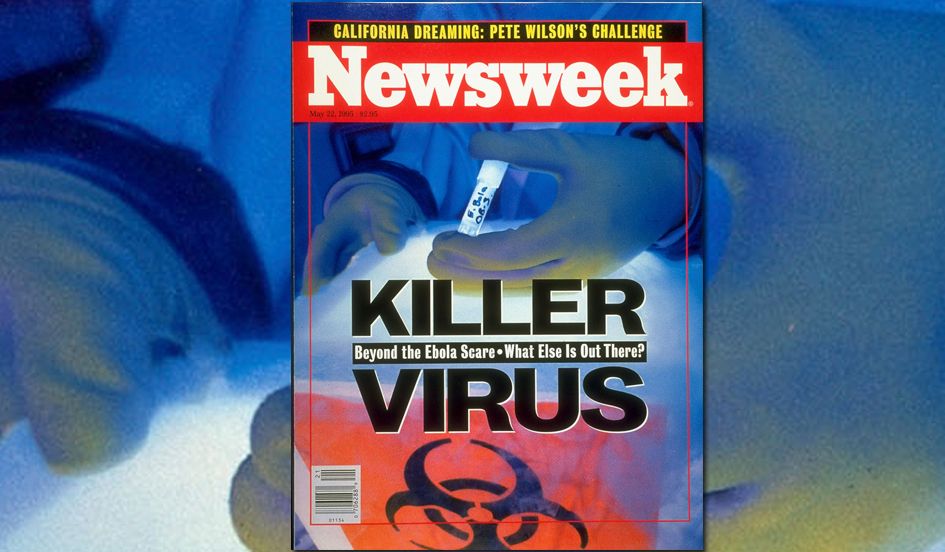
In West Africa, the deadliest Ebola outbreak in history has now claimed 729 lives, the World Health Organization announced today, including that of Sierra Leone's leading expert on the disease. Liberia has stopped its soccer matches, Reuters reports, and one African airline has temporarily stopped flying to that country and to Sierra Leone, while another has been suspended for ferrying a case into Nigeria.
In the United Kingdom, the government held an emergency meeting to talk about its response to the outbreak. In the United States, earlier this week, the Centers for Disease Control and Prevention said that "the response to this outbreak will be more of a marathon than a sprint," according a transcript of the remarks. Western nations are keeping a careful eye on an outbreak that so far has been limited to Guinea (where it started), Sierra Leone, Liberia and Nigeria (where one person died after flying in from Liberia). While the virus can kill up to 90 percent of those it infects, the death rate in this outbreak has been about 60 percent.
This is not the first time Ebola has been in the headlines. While the first known outbreak was in 1976, Newsweek spilled considerable ink about the justifiably scary virus in 1995, when Ebola killed 250 in what was then called Zaire (now the Democratic Republic of the Congo). The death rate that time was 81 percent.
By putting the words "killer virus" in all-capital letters on its cover, Newsweek seems to have played up the fear factor somewhat. In that outbreak, and the latest one, the chances of the virus jumping to the U.S. were slim. The accompany feature, titled "Outbreak of Fear," traced the beginnings of that outbreak: a lab tech named Kinfumu seems to have been the second known case, and evidently he infected at least two of the people who tended to him in the city of Kikwit in the Democratic Republic of the Congo.
"If the word [Ebola] doesn't make your hair stand on end, it should," Newsweek proclaimed.
Fear of viruses, maybe even more so than today, seems to have been in the air, culturally speaking, in the mid-1990s. The film Outbreak hit theaters just about two months before Newsweek ran its "Killer Virus" cover, and when it comes to scary overseas medical stories, that movie had it all—a virus born in Africa, an infected monkey, an American town under military lockdown.
As Newsweek worried, "We want to know whether Ebola is headed our way." The story was accompanied by a large global map titled "A World of Viruses," marked with colorful dots to show the various places in the world that deadly viruses like Lassa, Dengue and Rift Valley Fever have been found. The piece also explored the new factors that caused viruses to spread, like the way sub-Saharan African villages became linked to the rest of the world through "trucking and tourism," causing HIV to travel; or the way a warmer winter in 1993 caused a hantavirus, carried by mice, to infect people in the southwestern United States.
In a sidebar titled "Why Viruses Push Our Hot Buttons," Newsweek spoke to Richard Preston, author of the best-selling nonfiction book The Hot Zone. The interviewer asked him, "Why are people so fascinated by viruses these days?"
His response: "There's a deep curiosity, there's a sense of horror. And also I think that in the backs of people's minds, ever present, is the AIDS virus."
It seems likely that people worried more about AIDS in the 1990s than they do now. In the same feature story on Ebola and other viruses, Newsweek wrote:
New viruses have emerged with terrifying regularity in recent decades. Most are still obscure tropical menaces with names like Machupo and Oropouche. But because they're viral menaces, they're largely untreatable. And the AIDS epidemic has shown us what an obscure tropical menace can make of itself when the circumstances are right. Fifteen years ago, it was unimaginable. By the end of this decade, the global number of HIV infections should reach 40 million. And despite billions of dollars spent on years of intense research, AIDS is still a death sentence.
We know now that the 40 million number was an overestimation. While the numbers are still far too high, by 2000 it was less than 30 million, and in 2011 the number of existing HIV/AIDS cases was estimated to be 34 million globally, according to avert.org. "The overall growth rate of the epidemic," Avert says, "has stabilized in recent years."
People still have reason to worry about contracting HIV today, and films like Contagion—or even World War Z—explore themes similar to those in Outbreak. But perhaps viruses from distant places seemed newer, and thus more frightening, back in the '90s. With the viruses out there now, like SARS and MERS, and the (non-viral) anthrax scare after September 11, 2001—not to mention the attacks themselves—Americans may be a more thick-skinned people today.
Still, viruses, especially those like Ebola or HIV, are scary. And magazine covers did little to quell those fears. It feels at once selfish and natural for Americans to worry about Ebola making its way to our shores. In this most recent outbreak, the best we can hope for is that it is contained as soon as possible, and no more lives are lost.
Uncommon Knowledge
Newsweek is committed to challenging conventional wisdom and finding connections in the search for common ground.
Newsweek is committed to challenging conventional wisdom and finding connections in the search for common ground.
About the writer
Rob Verger is liaison to Newsweek’s foreign editions and also reports, writes, and edits. In addition to Newsweek and its ... Read more
To read how Newsweek uses AI as a newsroom tool, Click here.








